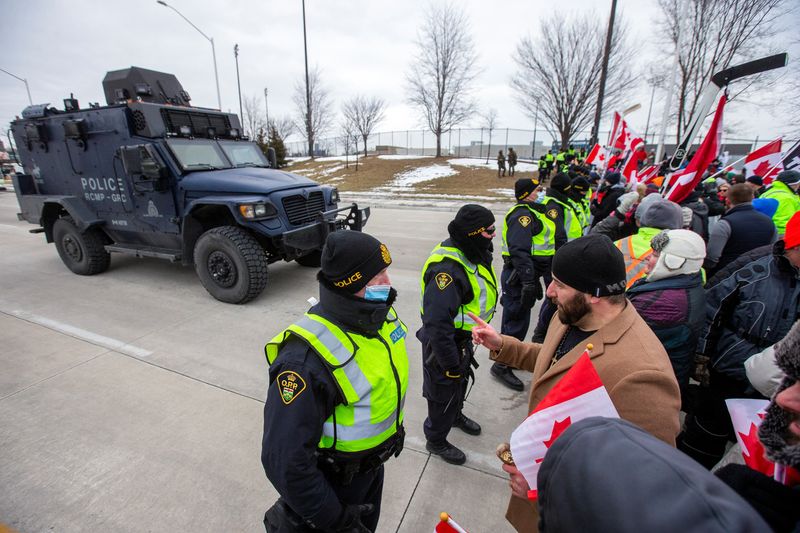2/2

© Reuters. FILE PHOTO: Protesters interact with police officers, who stand guard on a street after Windsor Police said that they are starting to enforce a court order to clear truckers and supporters who have been protesting against coronavirus disease (COVID-19) va
2/2
By Kayla Tarnowski and Chris Helgren
OTTAWA/WINDSOR, Ontario (Reuters) – Canadian police made several arrests on Sunday and cleared protesters and vehicles that had blocked a vital trade route on the border with the United States, but the bridge was not yet open to traffic on Sunday.
The officers moved in after a tense standoff between Canadian police and demonstrators since Friday when a court order and threats of arrest failed to end the six-day-old blockade of the Ambassador Bridge in Windsor, Ontario.
Windsor Police said in a statement on Sunday they arrested several people on a charge of mischief, without saying how many. Police also seized vehicles within the demonstration area, the statement added.
Police stepped up their presence on Sunday with more than 50 vehicles, including cruisers, buses and an armoured car, as the number of protesters dropped to around 45 from roughly 100 on Saturday. Windsor Police tweeted “there will be zero tolerance for illegal activity”.
Counter protests started blocking vehicles trying to join the protests on Sunday in Ottawa, with residents losing patience over the three-week-old demonstrations.
“We’re fed up, we’re tired. We want Ottawa to be boring again,” said an Ottawa resident at a counter protest in front of the city’s police headquarters.
The blockade of the bridge since Monday, North America’s busiest land border crossing, has choked the supply chain for Detroit’s carmakers.
The bridge carries about $360 million a day in two-way cargoes – 25% of the value of all U.S.-Canada goods trade.
“Today, our national economic crisis at the Ambassador Bridge came to an end,” Windsor City Mayor Drew Dilkens said in a tweet. He earlier told CBC News that he hopes the bridge will be open on Sunday.
The “Freedom Convoy” protests, started in the national capital Ottawa by Canadian truckers opposing a vaccinate-or-quarantine mandate for cross-border drivers, entered its 17th day on Sunday. But it has now morphed into a rallying point against broader COVID-19 curbs, carbon tax and other issues, with people joining in cars, pick-up trucks and farm vehicles.
Strangling bilateral trade, protests have spread to three border points, including in Alberta and Manitoba. Canadian police have said the protests have been partly funded by U.S. supporters, and Ontario froze funds donated via one U.S. platform GiveSendGo on Thursday.
Ford Motor (NYSE:F) Co, the second-largest U.S. automaker, General Motors Co (NYSE:GM) and Toyota Motor (NYSE:TM) Corp all have announced production cuts. Companies have diverted cargo to stem losses during the cuts.
The estimated loss so far from the blockades to the auto industry alone could be as high as $850 million, based on IHS Markit’s data, which puts the 2021 daily flow in vehicles and parts at $141.1 million a day.
“This is the busiest border crossing, so it’s not just automotive,” Dilkens said. “We are talking about things that impact the entire nation here.”
In Europe, a convoy of 150 cars protesting COVID-19 restrictions left Paris on Sunday morning and headed towards Brussels, protesters told Reuters.
Source: Investing.com


























